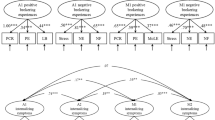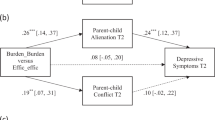Abstract
Language brokering is a special form of interpersonal communication that is affected by the cultural and relational settings in which it occurs. The current study explores whether parent–adolescent acculturation status may influence Mexican American adolescent language brokers’ translation experiences, including brokering frequency and attitudes. Using data from a two-wave longitudinal study (Nwave1 = 604; Nwave2 = 483; Mwave1.age = 12.91; 54.3% female), latent profile analyses were conducted, resulting in four mother–adolescent acculturation profiles as well as three father–adolescent profiles. The adolescent integrated–parent (moderately) separated profiles emerged as the most effective for brokers, as adolescents in this profile generally experienced more positive and less negative brokering attitudes, regardless of their brokering frequency. Parent–adolescent acculturation profiles may be a useful construct in capturing the interplay of cultural and relational settings and their effects on multifaceted language brokering experiences.


Similar content being viewed by others
References
Acoach, C. L., & Webb, L. M. (2004). The influence of language brokering on Hispanic teenagers’ acculturation, academic performance, and nonverbal decoding skills: a preliminary study. Howard Journal of Communications, 15, 1–19. https://doi.org/10.1080/10646170490275459.
Bámaca-Colbert, M. Y., & Gayles, J. G. (2010). Variable-centered and person-centered approaches to studying Mexican-origin mother–daughter cultural orientation dissonance. Journal of Youth and Adolescence, 39, 1274–1292. https://doi.org/10.1007/s10964-009-9447-3.
Berry, J. W. (1980). Social and cultural change. In H. C. Triandis & R. Brislin (Eds), Handbook of cross-cultural psychology (Vol. 5, pp. 211–279). Boston: Allyn & Bacon.
Burleson, B. R. (2010). The nature of interpersonal communication. In M. E. R. C. R. Berger, & D. R. Roskos-Ewoldsen (Eds), The handbook of communication science (pp. 145–164). Los Angeles, CA: Sage.
Chao, R. K. (2006). The prevalence and consequences of adolescents’ language brokering for their immigrant parents. In M. H. Bornstein & L. R. Cote (Eds), Acculturation and parent–child relationships: Measurement and development (pp. 271–296). Mahwah, NJ: Erlbaum.
Costigan, C. L., & Dokis, D. P. (2006). Relations between parent–child acculturation differences and adjustment within immigrant Chinese families. Child Development, 77, 1252–1267. https://doi.org/10.1111/j.1467-8624.2006.00932.x.
Dorner, L. M., Orellana, M. F., & Jiménez, R. (2008). “It’s one of those things that you do to help the family”: Language brokering and the development of immigrant adolescents. Journal of Adolescent Research, 23, 515–543. https://doi.org/10.1177/0743558408317563.
Dunn, A. L., & Tree, J. E. F. (2009). A quick, gradient bilingual dominance scale. Bilingualism: Language and Cognition, 12, 273–289. https://doi.org/10.1017/S1366728909990113.
Fuligni, A. J., Tseng, V., & Lam, M. (1999). Attitudes towards family obligations among American adolescents with Asian, Latin American, and European backgrounds. Child Development, 70, 1030–1044. https://doi.org/10.1111/1467-8624.00075.
Hooper, D., Coughlan, J., & Mullen, M. (2008). Structural equation modelling: guidelines for determining model fit. Electronic Journal of Business Research Methods, 6, 53–60. https://doi.org/10.21427/D7CF7R.
Hua, J., & Costigan, C. (2012). The familial context of adolescent language brokering within immigrant Chinese families in Canada. Journal of Youth and Adolescence, 1–13. https://doi.org/10.1007/s10964-011-9682-2
Jang, Y., Park, N. S., Chiriboga, D. A., & Kim, M. T. (2017). Latent profiles of acculturation and their implications for health: a study with Asian Americans in Central Texas. Asian American Journal of Psychology. https://doi.org/10.1037/aap0000080
Jones, C. J., Trickett, E. J., & Birman, D. (2012). Determinants and consequences of child culture brokering in families from the former Soviet Union. American Journal of Community Psychology, 50, 182–196. https://doi.org/10.1007/s10464-012-9488-8.
Kam, J. A. (2009). Disentangling the effects of cultural brokering among Mexican-heritage youth (Doctoral dissertation). State College, PA: The Pennsylvania State University.
Kam, J. A., & Lazarevic, V. (2014). Communicating for one’s family: An interdisciplinary review of language and cultural brokering in immigrant families. In E. L. Cohen (Ed.), Communication yearbook38 (pp. 3–38). New York: Routledge.
Kim, S. Y., Hou, Y., Shen, Y., & Zhang, M. (2017). Longitudinal measurement equivalence of subjective language brokering experiences for mothers and fathers in Mexican American adolescents. Cultural Diversity and Ethnic Minority. Psychology, 23, 230–243. https://doi.org/10.1037/cdp0000117.
Kim, S. Y., Wang, Y., Chen, Q., Shen, Y., & Hou, Y. (2015). Parent–child acculturation profiles as predictors of Chinese American adolescents’ academic trajectories. Journal of Youth and Adolescence, 44, 1263–1274. https://doi.org/10.1007/s10964-014-0131-x.
Kim, S. Y., Wang, Y., Weaver, S. R., Shen, Y., Wu-Seibold, N., & Liu, C. H. (2014). Measurement equivalence of the language-brokering scale for Chinese American adolescents and their parents. Journal of Family Psychology, 28, 180–192. https://doi.org/10.1037/a0036030.
Knight, G. P., Gonzales, N. A., Saenz, D. S., Bonds, D. D., Germán, M., Deardorff, J., & Updegraff, K. A. (2010). The Mexican American Cultural Values Scale for adolescents and adults. The Journal of Early Adolescence, 30, 444–481. https://doi.org/10.1177/0272431609338178.
Knight, G. P., Jacobson, P., & Gonzales, A. (2009). Enculturation processes among recently immigrating populations. In R. L. Dalla, J. Defrain, J. Johnson & D. A. Abbott (Eds), Strengths and challenges of new immigrant families: Implications for research, education, policy, and service (pp. 9–31). Lanham, MD: Lexington Books.
Krogstad, J. M. (2016). Rise in English proficiency among U.S. Hispanics is driven by the young. Washington, DC: Pew Research Center.
McQuillan, J., & Tse, L. (1995). Child language brokering in linguistic minority communities: Effects on cultural interaction, cognition, and literacy. Language and Education, 9, 195–215. https://doi.org/10.1080/09500789509541413.
Muthén, L. K., & Muthén, B. O. (1998–2012). Mplus user’s guide (7th edn.). Los Angeles, CA: Muthén & Muthén.
Nieri, T., Lee, C., Kulis, S., & Marsiglia, F. F. (2011). Acculturation among Mexican-heritage preadolescents: a latent class analysis. Social Science Research, 40, 1236–1248. https://doi.org/10.1016/j.ssresearch.2011.02.005.
Nylund, K. L., Asparouhov, T., & Muthén, B. O. (2007). Deciding on the number of classes in latent class analysis and growth mixture modeling: a Monte Carlo simulation study. Structural Equation Modeling, 14, 535–569. https://doi.org/10.1080/10705510701575396.
Roche, K. M., Lambert, S. F., Ghazarian, S. R., & Little, T. D. (2015). Adolescent language brokering in diverse contexts: Associations with parenting and parent–youth relationships in a new immigrant destination area. Journal of Youth and Adolescence, 44, 77–89. https://doi.org/10.1007/s10964-014-0154-3.
Ryder, A. G., Alden, L. E., & Paulhus, D. L. (2000). Is acculturation unidimensional or bidimensional? A head-to-head comparison in the prediction of personality, self-identity, and adjustment. Journal of Personality and Social Psychology, 79, 49–65. https://doi.org/10.1037/0022-3514.79.1.49.
Salas-Wright, C. P., Clark, T. T., Vaughn, M. G., & Córdova, D. (2015). Profiles of acculturation among Hispanics in the United States: links with discrimination and substance use. Social Psychiatry and Psychiatric Epidemiology, 50, 39–49. https://doi.org/10.1007/s00127-014-0889-x.
Schwartz, S. J., Unger, J. B., Baezconde-Garbanati, L., Zamboanga, B. L., Córdova, D., Lorenzo-Blanco, E. I., & Szapocznik, J. (2016). Testing the parent–adolescent acculturation discrepancy hypothesis: A five-wave longitudinal study. Journal of Research on Adolescence, 26, 567–586. https://doi.org/10.1111/jora.12214.
Schwartz, S. J., & Zamboanga, B. L. (2008). Testing Berry’s model of acculturation: a confirmatory latent class approach. Cultural Diversity and Ethnic Minority Psychology, 14, 275–285. https://doi.org/10.1037/a0012818.
Sellers, R. M., Rowley, S. A. J., Chavous, T. M., Shelton, J. N., & Smith, M. A. (1997). Multidimensional Inventory of Black Identity: a preliminary investigation of reliability and construct validity. Journal of Personality and Social Psychology, 73, 805–815. https://doi.org/10.1037/0022-3514.73.4.805.
Shen, Y., Tilton, K. E., & Kim, S. Y. (2017). Outcomes of language brokering, mediators, and moderators: A systematic review. In R. S. Weisskirch (Ed.), Language brokering in immigrant families: Theories and contexts. New York, NY: Routledge.
Stepler, R., & Brown, A. (2015). Statistical portrait of Hispanics in the United States, 1980–2013. Washington, DC: Pew Research Center.
Telzer, E. H. (2010). Expanding the acculturation gap-distress model: An integrative review of research. Human Development, 53, 313–340. https://doi.org/10.1159/000322476.
Telzer, E. H., Yuen, C., Gonzales, N., & Fuligni, A. J. (2016). Filling gaps in the acculturation gap-distress model: Heritage cultural maintenance and adjustment in Mexican–American families. Journal of Youth and Adolescence. https://doi.org/10.1007/s10964-015-0408-8.
Little, T. D., Cunningham, W. A., Shahar, G., & Widaman, K. F. (2002). To parcel or not to parcel: Exploring the question, weighing the merits. Structural Equation Modeling, 9, 151–173. https://doi.org/10.1207/S15328007SEM0902_1.
Trickett, E. J., & Jones, C. J. (2007). Adolescent culture brokering and family functioning: A study of families from Vietnam. Cultural Diversity and Ethnic Minority Psychology, 13, 143 https://doi.org/10.1037/1099-9809.13.2.143.
Umaña-Taylor, A. J., Yazedjian, A., & Bámaca-Gómez, M. (2004). Developing the ethnic identity scale using Eriksonian and social identity perspectives. Identity, 4, 9–38. https://doi.org/10.1207/S1532706XID0401_2.
Villanueva, C. M., & Buriel, R. (2010). Speaking on behalf of others: a qualitative study of the perceptions and feelings of adolescent Latina language brokers. Journal of Social Issues, 66, 197–210. https://doi.org/10.1111/j.1540-4560.2009.01640.x.
Weisskirch, R. S. (2005). The relationship of language brokering to ethnic identity for Latino early adolescents. Hispanic Journal of Behavioral Sciences, 27, 286–299. https://doi.org/10.1177/0739986305277931.
Weisskirch, R. S. (2007). Feelings about language brokering and family relations among Mexican American early adolescents. The Journal of Early Adolescence, 27, 545–561. https://doi.org/10.1177/0272431607302935.
Weisskirch, R. S., Kim, S. Y., Zamboanga, B. L., Schwartz, S. J., Bersamin, M., & Umana-Taylor, A. J. (2011). Cultural influences for college student language brokers. Cultural Diversity and Ethnic Minority Psychology, 17, 43–51. https://doi.org/10.1037/a0021665.
Weisskirch, R. S. (2017a). A developmental perspective on language brokering. In R. S. Weisskirch (Ed.), Language brokering in immigrant families: theories and contexts. New York, NY: Routledge.
Weisskirch, R. S. (2017b). Future directions for language brokering research. In R. S. Weisskirch (Ed.), Language brokering in immigrant families: theories and contexts. New York, NY: Routledge.
Wu, N. H., & Kim, S. Y. (2009). Chinese American adolescents’ perceptions of the language brokering experience as a sense of burden and sense of efficacy. Journal of Youth and Adolescence, 38, 703–718. https://doi.org/10.1007/s10964-008-9379-3.
Authors’ Contributions
M.Z. created the design of the study, performed the statistical analysis and drafted portions of the manuscript; S.Y.K. drafted portions of the manuscript, provided critical review and editing of the manuscript; Y.H. provided constructive ideas to the design of the study, provided critical review and editing of the manuscript; and Y.S. provided critical review and editing of the manuscript. All authors read and approved the final manuscript.
Funding
Support for this research was provided through awards to S.Y.K. from (1) National Science Foundation, Division of Behavioral and Cognitive Sciences, 1651128 and 0956123 (2) Eunice Kennedy Shriver National Institute of Child Health and Human Development 5R03HD060045-02 (3) Office of the Vice President for Research and Creative Grant and Special Research Grant from the University of Texas at Austin, and (4) Eunice Kennedy Shriver National Institute of Child Health and Human Development 5P2CHD042849-17 grant awarded to the Population Research Center at The University of Texas at Austin. Correspondence concerning this article should be sent to M.Z., Department of Human Development and Family Sciences, University of Texas at Austin, 108 E. Dean Keeton St., Stop A2702, Austin, Texas 78712-1248. E-mail: zhangminyu@utexas.edu.
Data Sharing and Declaration
This manuscript’s data will not be deposited.
Author information
Authors and Affiliations
Corresponding author
Ethics declarations
Conflict of Interest
The authors declare that they have no conflict of interests.
Ethical Approval
All procedures performed in studies involving human participants were in accordance with the ethical standards of the institutional and/or national research committee and with the 1964 Helsinki declaration and its later amendments or comparable ethical standards.
Informed Consent
Informed consent was obtained from all individual participants included in the study.
Additional information
Publisher’s note: Springer Nature remains neutral with regard to jurisdictional claims in published maps and institutional affiliations.
Rights and permissions
About this article
Cite this article
Zhang, M., Kim, S.Y., Hou, Y. et al. Parent–Adolescent Acculturation Profiles and Adolescent Language Brokering Experiences in Mexican Immigrant Families. J Youth Adolescence 49, 335–351 (2020). https://doi.org/10.1007/s10964-019-01064-5
Received:
Accepted:
Published:
Issue Date:
DOI: https://doi.org/10.1007/s10964-019-01064-5




